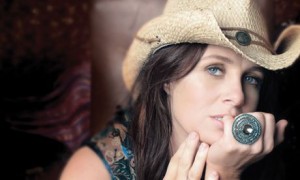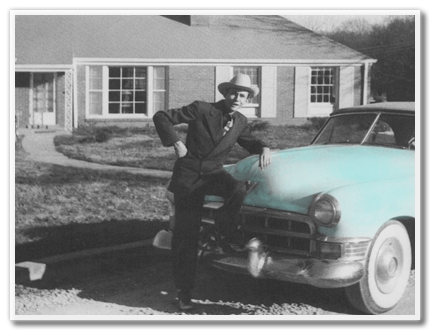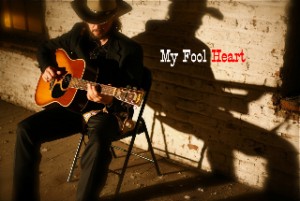 For a movie slated for test-screening next month in Charlottesville, VA (fitting since the the movie takes place in Virginia) details on My Fool Heart (Facebook) are as rare as hen’s teeth.
For a movie slated for test-screening next month in Charlottesville, VA (fitting since the the movie takes place in Virginia) details on My Fool Heart (Facebook) are as rare as hen’s teeth.
Here’s what we do know, first the official story brief : “… Jim Waive stars as a humble Virginia diner singer who is the target of two London hit men in the debut feature film MY FOOL HEART from writer-director Jeffrey Martin.” “Throughout the movie, Jim Waive keeps losing his treasured possessions. Justin plays the Mysterious man who finds Jim’s lost things on the sidewalks of Nashville.”
Then there’s the extraordinary cast from Americana, Country and Bluegrass music fields – Elizabeth Cook, Justin Townes Earle, Merle Haggard, Wayne Henderson, Sarah Jarosz, Jim Lauderdale, Charlie McCoy, Jesse McReynolds, Dr. Ralph Stanley and Jim Waive and the Young Divorcees
Then there’s the oddly dark “Popcorn teaser” posted on YouTube.
I contacted the writer-director Jeffrey Martin on the road to shed some light on this intriguing film. He was very forthcoming in an email interview on his motivation for the film and how how love of music helped to influence My Fool Heart.
I very much look forward to seeing this film soon and readers of this blog might feel the same way after reading this interview. Enjoy
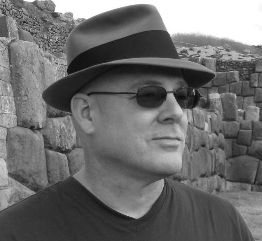
Baron Lane – Who are some of your influences as a director?
Jeffrey Martin – MY FOOL HEART was influenced by Cassavettes and other directors who believed even if your bank account was low you could grab a camera and make a movie. It’s a stupid idea but it obviously influenced me. When you make a really cheap film, you get to call the shots and take extravagant chances. Sometimes they pay off.
BL – My Fool Heart is billed as a comedy, but based on what i’ve been able to glean online it looks more like a black comedy. Is that accurate?
JM – Most black comedies have a more bitter or cynical take on life. I think of MY FOOL HEART in the classical sense of comedy. It’s about how things come out in the end and in this movie things do come out okay in the end. But coming out okay is a serious struggle. For me, whenever you look closely at anything in life, especially the serious things like love, marriage, children, death, there is something comical. It’s like when things in life get so bad and crazy you have to just laugh. In the South, tragedy and comedy seem tightly intertwined. Weird and terrible things happen and people laugh about it. Humor makes a lot of things more bearable. Life is hard. There’s not a lot of cynicism in this movie.
BL – What time period is the movie set in? How did that time period shape the music chosen for the movie?
JM – The movie is set today. It’s also set in Virginia which is a place where long ago and today sit side-by-side. That’s what I love about Virginia. I grew up in California and Florida suburbs so when I first went to Virginia I was enchanted by the old things. Even current things seem to have an old feeling in Virginia like a faded photograph or like you’re looking through wavy antique glass. I love Virginia. I spent 30 years there, but I’m not a native. To be really from Virginia isn’t like a jacket you can buy or just put on. The music chosen began in Albemarle County, Virginia and moved outward. If you’re into Americana or bluegrass music, you’ll notice all the lines and connections. The geography lessons.
BL – Where did your story of My Fool Heart come from?
JM – I don’t know. Strange things just pop into my head. I saw Jim Waive, a local Charlottesville musician, playing for tips at the Blue Moon Diner and this whole crazy idea came into my head about a musician like Jim being hunted down by professional killers. It seemed both serious and funny. Like what kind of great music he might start writing under the pressure of death. Like in the old westerns when the bad guys shot at your feet and made you dance.
BL – Cameron Crowe and Quentin Tarantino create films where the music becomes a character in the film. Does music come front and center in My Fool Heart?
JM- Music is huge in this film. It’s the subject and it’s the air you breath watching the movie.  But the movie’s plot and characters are also commenting on the music you’re hearing which is a little unusual in a fictional feature film. Also the bluegrass, country and Americana music – old and new – blend together in a way that maybe makes you think of the music’s history if you’re a music fanatic. Crowe and Tarantino are both great, but they use music differently.
BL – What did you grow up listening to?
I had older brothers so I grew up deeply immersed in the music of the 1960’s and 1970’s: Dylan, the Beatles, the Band, the Beach Boys, Van Morrison. I went to college in North Carolina and first heard Emmylou Harris who had just moved away from Greensboro and cut her first album. I got to see Lester Flatt when Marty Stuart was his teenage guitar player. Also lots of bluegrass and pickers and bands like the Dillards who were playing locally then. I was listening to that first Scruggs Brothers LP, Doug Sahm Band, John Hartford, Johnny Cash, Earl Scruggs, Mac Wiseman, Doc and Merle Watson. The mid-Atlantic was an amazing musical region during the 70’s and 80’s with people like Emmylou Harris, Danny Gatton, Stevie Ray Vaughn playing in ridiculously tiny venues. I stood next to all of them playing their sets, two feet away. The Band, as well, with Richard Manuel singing in that beautiful voice. I always liked old American sounds.
Lucinda, who co-produced the movie, was from Charlottesville, Virginia and took me up there when I was 18. She’s from really old Virginia culture. Her great grandfather, Col. Charles Marshall, was General Lee’s military secretary who spent the entire Civil War on Lee’s personal staff and wrote Lee’s famous Farewell to the Troops and is the guy between Lee and Grant in the schoolbook Appomattox painting. Lucinda introduced me to the mountain people still living in Sugar Hollow where they had a farm. Hand-churned butter, brown eggs, horses and wagons – I thought I was dreaming but there it was: time frozen. A lot of that gets into the movie somehow. Lucinda went to country dances out there in the Hollow with the Virginia Vagabonds playing, some of those guys played at the White House for FDR. For her, this would have been as a litle girl around the early 1960’s when Paul Clayton had his cabin near there. Bob Dylan visited the area for a week in 1962 and it seems to have revolutionized his world when he went back to New York and came up with “Don’t Think Twice It’s Alright.” Dylan writes about all that in “Chronicles.” Dylan’s deep inside this movie. Jesse McReynolds and other older bluegrass guys told me about Dylan’s influence on them. We tend to think the river flowed the other way, but it was definitely two directions according Jesse. It’s hard to underestimate the influence of Bob Dylan on music. He’s way bigger than Hank Williams and that’s a stupid comment to make if you haven’t thought about it too much. I dug into Appalachian music up one side and down the other and kept seeing Bob Dylan peeking out. Growing up though I also listened to whatever came on the radio. It was a great time. As a teenager, I moved to Winter Haven, Florida where Gram Parsons was from. He was a Snively so he was related to everyone down there. I remember my next older brother talking about him and all that country music. And in college in Greensboro, N.C., Emmylou Harris was playing down on Tate Street just a few years before so I picked up on her when the first album came out and never let go. I remember being 15 in Florida and turning out all the lights in the house and listening to Johnny Cash “Folsom Prison” and imagining I was in jail. Until I left Florida, part of me was.
BL – The cast for My Fool Heart -Â Merle Haggard, Dr. Ralph Stanley, Jim Lauderdale, Elizabeth Cook, Justin Townes Earle – reads like a who’s who of classic country and Americana. What was the motivation behind casting such a heavy assortment of musicians?
JM – My joke rule was that nobody who was a SAG member could be in the movie. Keep it to nonprofessional actors. We did become a SAG movie though when Merle joined us. The inspiration or idea came from this thought I had. I sat and watched Jim Waive play at the diner for tips and drew this imaginary line from the guys at the bottom playing for free and going all through the middle level and to the very top of the music business, the icons. I thought the story was about that. What is success? Is it talent? Luck? I knew people at the top always considered themselves just a step away from that diner tip jar because you never forget where you came from. And sure enough, a bunch of them dug the idea and wanted to play a part in it. We wound up with Dr. Ralph Stanley and Jesse McReynolds, two IBMA Bluegrass Hall of Fame members. Also Merle Haggard and Charlie McCoy, two Country Hall of Fame members. I used to sit on my bed reading Dylan’s liner notes and I would always see the name Charlie McCoy. It came full circle for me when Charlie agreed to give me a tour of Nashville and that old recording world of working with Elvis, Roy Orbison, Johnny Cash – all the greats. That’s in the movie. It’s worth the price of admission. And Jesse McReynolds tells about playing with Bob Wills, amazing stuff. But it’s not a documentary. This all unfolds in the course of the story.
BL – Finding one musician that can act is pretty rare, where you concerned with the high odds of bad acting in such a large roster of musicians?
JM – Filming musicians is like handling dynamite. You have to be on your toes.
Everybody gets nervous. Merle was nervous. I was nervous. Ralph Stanley told me that he’d been dreading it for days. But if you can help them relax and just take the temperature down and get into that space, strange and wonderful things happen. Merle is powerful and mesmerizing. I wrote his lines, but Merle went deep into the country preacher. And Justin Townes Earle is fantastic. Most of the film, he’s silent. Then at the end, he finally talks and he has the entire film on his shoulders. Justin is a sweet, soulful, deep guy and he brought something to the film that I never expected. I actually expanded his part to use all his great footage. Merle too.
BL – What was your background in music and how did you choose the music for the movie?
JM – I have no background in music. I sang in my elementary school choir until the director tried to isolate where the bad voice was. When I stopped singing and just faked it, she said, “That’s better.” I have no talent which is good. I’m 100% enthusiastic fan. Musicians fear no competition from me. I’m in awe of musicians. I can’t duplicate what they do. I’m not a director or writer with a guitar at home. I suck at everything musical except loving it.  MY FOOL HEART’s soundtrack is the music I love: Elizabeth Cook, Merle Haggard, Charlie McCoy, Jesse McReynolds, Wayne Henderson, Jim Lauderdale, Ralph Stanley, Justin Townes Earle.
BLÂ – If you could make a biographic film of one musician’s life who would it be and why?
JM – I don’t think I’d be interested. The magic is in the songs, not the person. Documentary is a better angle on hitting that target. A biopic wouldn’t be my thing.
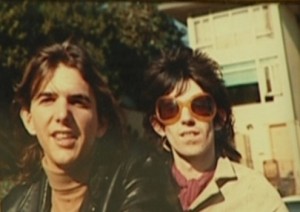 In the summer of ’71 The Rolling Stones took exile in the South of France in Villa Nellcôte– a 16 room waterfront mansion that once served as Gestapo headquarters for the Nazis during WWII.
In the summer of ’71 The Rolling Stones took exile in the South of France in Villa Nellcôte– a 16 room waterfront mansion that once served as Gestapo headquarters for the Nazis during WWII.


